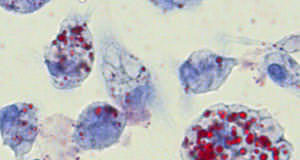Losing Weight From Either A Low-Carb Or Low-Fat Diet Lowers Body...
A study by researchers at Johns Hopkins Medicine shows that when overweight or obese people lose weight, whether through a low-carb or low-fat diet, they can have a significant reduction in inflammation throughout their body, as measured by three common markers for inflammation.
Every Single Junk Food Meal Damages Your Arteries, New Study Reveals
A single junk food meal -- composed mainly of saturated fat -- is detrimental to the health of the arteries, while no damage occurs after consuming a Mediterranean meal rich in good fats such as mono-and polyunsaturated fatty acids, according to researchers at the University of Montreal-affiliated ÉPIC Center of the Montreal Heart Institute. The Mediterranean meal may even have a positive effect on the arteries.
Changes In Sleep Architecture Increase Hunger, Eating
A new study shows that both length of time and percentage of overall sleep spent in different sleep stages are associated with decreased metabolic rate, increased hunger, and increased intake of calories (specifically from fat and carbohydrates). The findings suggest an explanation for the association between sleep problems and obesity.
Obese Brain May Thwart Weight Loss: Diets High In Saturated Fat,...
"Betcha can't eat just one!" For obese people trying to lose weight, advertising slogans such as this one hit a bit too close to home as it describes the daily battle to resist high calorie foods. But new research by Terry Davidson, director of American University's Center for Behavioral Neuroscience, indicates that diets that lead to obesity...
New Way Of Fighting High Cholesterol Upends Assumptions
Atherosclerosis -- the hardening of arteries that is a primary cause of cardiovascular disease and death -- has long been presumed to be the fateful consequence of complicated interactions between overabundant cholesterol and resulting inflammation in the heart and blood vessels.
Immune System Molecule Affects Our Weight
Researchers at the Sahlgrenska Academy, University of Gothenburg, Sweden, have identified a molecule in the immune system that could affect hunger and satiety. The researchers hope that new treatments for obesity will benefit from this finding.
Adequate Sleep Helps Weight Loss
Adequate sleep is an important part of a weight loss plan and should be added to the recommended mix of diet and exercise, states a commentary in CMAJ (Canadian Medical Association Journal).
Experts Recommend Screening Adults For Hypertriglyceridemia Every Five Years
The Endocrine Society today issued a Clinical Practice Guideline (CPG) for the diagnosis and treatment of hypertriglyceridemia. Triglycerides are a type of fat found in the blood and are associated with cardiovascular risk. The CPG, entitled "Evaluation and Treatment of Hypertriglyceridemia: An Endocrine Society Clinical Practice Guideline" appears in the September 2012 issue of the Journal of Clinical Endocrinology and Metabolism (JCEM), a publication of The Endocrine Society.
Even Small Weight Gains Raise Blood Pressure In College Students
As a college student, you may be happy simply not to have gained the "Freshman 15." But a University of Illinois study shows that as little as 1.5 pounds per year is enough to raise blood pressure in that age group, and the effect was worse for young women.
A Carefully Scheduled High-Fat Diet Resets Metabolism And Prevents Obesity, Researchers...
New research from the Hebrew University of Jerusalem shows that a carefully scheduled high-fat diet can lead to a reduction in body weight and a unique metabolism in which ingested fats are not stored, but rather used for energy at times when no food is available.
Why Some Fats Are Worse Than Others
All dietary fats are not created equal. Some types of fats have been linked to ailments like heart disease and diabetes, while others, like those often found in plants and fish, have well documented health benefits. So why do our bodies respond so destructively to some fats but not others? A new hypothesis described in latest issue of The Quarterly Review of Biology suggests the answer may lie in how different fats interact with the microbes in our guts.
Is Long-Term Weight Loss Possible After Menopause?
Many people can drop pounds quickly in the early phases of a diet, but studies have found that it is difficult to keep the weight off in the long term. For post-menopausal women, natural declines in energy expenditure could make long-term weight loss even more challenging. A new study finds that in post-menopausal women, some behaviors that are related to weight loss in the short term are not effective or sustainable for the long term. Interventions targeting these behaviors could improve long-term obesity treatment outcomes.















